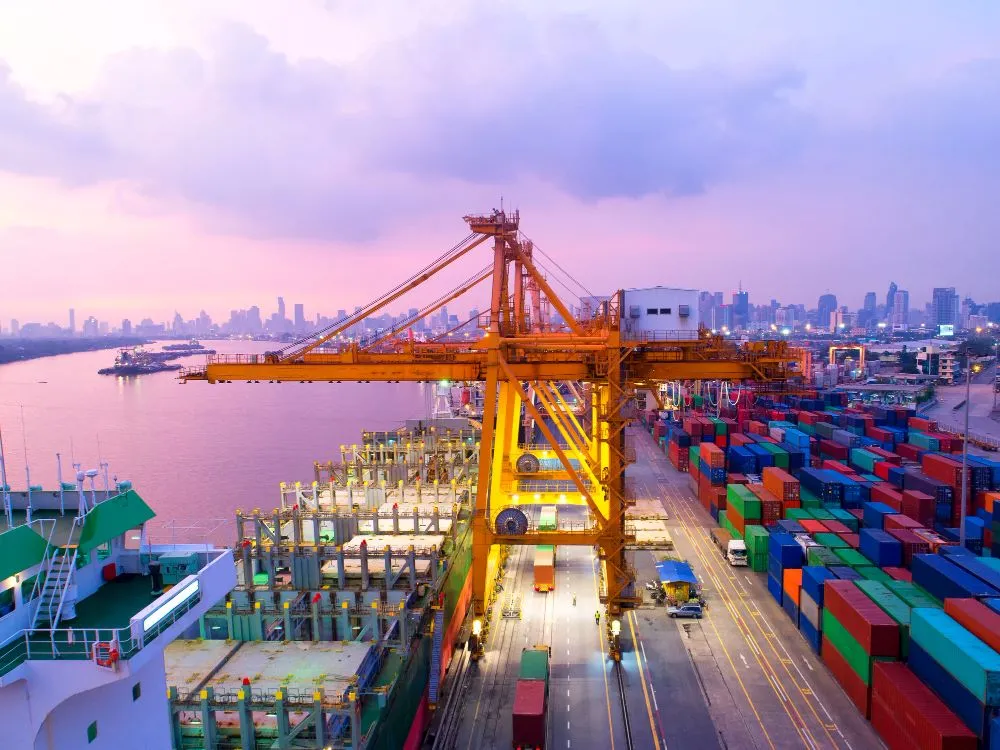Export-import business is one of the promising types of businesses in Indonesia. However, many people are still hesitant to start this business because it is considered difficult and requires a large capital.
In fact, with advances in technology and easy access to information, the export-import business can be run more easily and efficiently. Especially in Indonesia, which has abundant resources. Sobat BFI, let's discuss tips on starting an export-import business in Indonesia.
1. About Export-Import
1.1 What is Import?
Import is the activity of purchasing goods or services from abroad and bringing them into a country. Imported goods can be items not produced domestically or products produced domestically but insufficient to meet market demand.
In the export-import business, imports are an essential component as they allow us to obtain raw materials or products at lower prices and better quality.
Importing is not just about obtaining goods unavailable locally but also about getting these goods at a lower cost, which in turn can increase business profit margins. It also allows access to advanced technology and components that may not be produced domestically, enabling companies to remain competitive in the global market.
1.3 What is Export?
Export is the activity of selling goods or services from within a country to abroad. Exported goods are usually a country's flagship products that have high demand in international markets.
In the export-import business, exports are a primary source of income that can help boost a country's economy.
Exports provide a broader market for domestic products, increasing sales and production volumes. This also encourages growth and job creation and can generate foreign exchange crucial for a country's trade balance.
2. Risks in Running an Export-Import Business
2.1 Demand Changes
Market demand can change rapidly due to various factors such as consumer trends, economic conditions, and competition. The export-import business must be able to anticipate and respond to these changes. If demand suddenly drops, companies may experience stockpiles and revenue declines. Therefore, accurate and up-to-date market analysis is crucial to predict demand changes and adjust business strategies accordingly.
2.2 Regulation Changes
Each country has different regulations related to international trade, and these regulations can change at any time. Regulatory changes may include import and export tariffs, quotas, restrictions on certain goods, and document requirements. Companies not complying with these changes may face legal issues, fines, or obstacles in the shipping process. To mitigate this risk, companies need to continually monitor the latest regulations and ensure compliance with applicable regulations in the destination country.
2.3 Currency Value Fluctuations
Fluctuations in foreign exchange rates can affect profits in the export-import business. If a country's currency value suddenly drops, the sales value received could be lower than expected. Conversely, if the destination country's currency strengthens, import costs become more expensive. To manage this risk, companies can use financial instruments such as hedging or forward contracts to protect transaction values from currency fluctuations.
2.4 Shipping Delays
Shipping delays can occur for various reasons such as bad weather, logistical issues, or port bureaucracy. These delays can cause financial losses and a loss of customer trust. Companies should have contingency plans and work with reliable logistics service providers to minimize the risk of shipping delays. Additionally, good communication with customers is also essential to maintain transparency and expectations.
2.5 Cargo Damage
Damage to goods during shipping is a constant risk in the export-import business. Causes of damage can vary from improper handling, extreme weather conditions, to transportation accidents. To protect goods, companies need to ensure that items are well-packaged and use reliable shipping services. Cargo insurance is also an essential step to cover losses due to damage during transit.
2.6 Payment Delays
Payment delays by overseas buyers can affect cash flow and financial stability. Companies need to evaluate buyer credit and may request advance payments to reduce the risk of payment delays. Using professional collection services or export credit insurance can also help secure payments and reduce financial risks.
3. 10 Tips for Starting an Export-Import Business
Image Source: Freepik
If you are interested in doing export-import business, you need to know how to start. Here are initial tips for beginners:
3.1 In-depth Market Research
Before starting an export-import business, the first step is conducting in-depth market research. Analyze the market to understand current market trends, identify competitors, and identify potential risks and opportunities. Comprehensive research will help you make the right strategic decisions for your business.
3.2 Determine Export Products
Choose the right export products based on market demand, product quality, and product uniqueness to gain a competitive edge. Ensure that the selected products have a good market share and promising export prospects.
3.3 Determine Export Destination Countries
Identify potential export destination countries by considering factors such as market demand, market conditions, trade regulations, and cultural aspects. Choosing the right destination country is key to the success of your product export. Don't forget to check the export requirements to the destination country.
3.4 Prepare Capital
Prepare sufficient capital to support your export-import business activities. You can consider options such as applying for a loan at a bank or through a finance company like BFI Finance. Sufficient capital will ensure the smooth operation and growth of your business.
3.5 Meet Legal and Regulatory Requirements
Ensure you meet all legal and regulatory requirements related to the export-import business. A good understanding of these rules will help you avoid legal issues that could hinder your business in the future.
Generally, some legal requirements for running an export-import business are:
● Trade Business License (SIUP)
● Company Registration Certificate (TDP)
● Tax Identification Number (NPWP)
● Export/Import Business Permit (API)
Other regulations in Indonesia and the export destination country
3.6 Create a Comprehensive Business Plan
Develop a comprehensive business plan that includes marketing strategies, product sample development, financial projections, and other essential aspects of your business. A good business plan will serve as a guide to help you achieve your business goals more directionally.
3.7 Understand International Trade Procedures
Learn international trade procedures in-depth, including documentation, customs regulations, and shipping processes. Understanding these procedures will facilitate your export-import operations and reduce risks related to procedural errors.
3.8 Build a Good Network
Build a solid network with suppliers, distributors, government agencies, and other stakeholders in the export-import industry. Good networking will open new opportunities, expand business networks, and support long-term business growth. You can also expand your network by joining Export-Import Associations and Business Associations in your country.
3.9 Utilize Technology
In this digital era, the use of technology such as websites, social media, and applications is highly recommended for business development, including in the export-import sector. You can create a website showcasing products to be exported so that audiences worldwide can learn about your products digitally. You can also create accounts on e-commerce platforms to reach B2B (business to business) buyers.
3.10 Stay Updated with Latest Information
Get used to reading news, articles, and the latest publications both in offline and online media to gain more knowledge in this industry. You can also attend seminars or trade shows to add product references and directly discuss with experts.
4. How to Find Overseas Buyers
Here are tips to make your products more recognized and gain potential buyers from abroad:
4.1 Create a Company Website in English
It's important to create a company website in English, as it is the universal language to reach potential buyers from abroad. When building the website, ensure the authenticity of the content and clarity of information. Provide complete information about the products or services offered, business description, and easily reachable contacts. By ensuring the quality and professionalism of the company's website, you can enhance your business image and attract potential buyers from various countries.
4.2 Advertise on Google and Facebook
To increase your business visibility, you can run ads through platforms like Google Ads and Facebook Ads. Google Ads allows you to display your business ads in Google search results, making it easier for potential buyers searching for the products or services you offer to find your business. Facebook Ads, on the other hand, allows you to target your ads to audiences that match relevant demographics, interests, and behaviors. Using these advertising strategies, you can effectively reach potential buyers from abroad and expand your business reach.
4.3 Find Prospects on E-Commerce Applications
Besides utilizing websites and digital advertising, you can also find potential buyers from abroad through e-commerce applications. Focus your search on e-commerce platforms that prioritize business-to-business (B2B) relationships. When searching for prospects, consider factors such as the reputation and credibility of companies on the platform. Build relationships with key stakeholders, such as manufacturers, distributors, and trade agents, to find potential buyers and expand your business network.
5. 10 Recommendations for Profitable Export Products
Here are some of Indonesia's leading export products that are in high demand by customers worldwide:
5.1 Textiles
Textiles are one of Indonesia's flagship export products. Indonesian characteristic textile products such as batik, tapis cloth, ready-made clothing, and bags have high demand in the international market. The beauty of the patterns and the quality of Indonesian textile products are additional values that attract potential buyers from abroad.
5.2 Coffee
Coffee is one of Indonesia's main export commodities. Indonesian coffee is famous worldwide for its distinctive taste and premium quality. Varieties such as Aceh Arabica coffee, Mandailing, Kintamani, Lampung Robusta coffee, and Luwak coffee are some examples of coffee varieties highly favored by coffee lovers worldwide. By maintaining production quality and innovating in coffee processing, you can successfully develop a coffee export business.
5.3 Spices
Indonesia is also known as a country producing high-quality spices. Spices such as ginger, turmeric, galangal, vanilla, pepper, cinnamon, and cloves are widely used in the food, beverage, and pharmaceutical industries worldwide. The demand for Indonesian spices continues to increase, making them very profitable export products.
5.4 Cocoa/Chocolate
Cocoa is the primary raw material for chocolate production. Indonesia is one of the largest cocoa producers in the world. Indonesian cocoa has distinctive and varied flavors. By maintaining the quality and sustainability of cocoa production, you can leverage the growing global market in the chocolate industry.
5.5 Palm Oil and Its Derivatives
With extensive oil palm plantations, palm oil and its derivatives have long been Indonesia's main export commodities. Palm oil and its derivative products, such as food ingredients, cooking oil, soap, and cosmetics, have stable demand in international markets. In developing the palm oil export business, it is essential to pay attention to sustainability factors in production and comply with good environmental standards.
5.6 Fish and Fishery Products
Indonesia's abundant marine resources make fishery products one of the flagship commodities in exports. Products such as fresh fish, shrimp, processed fish, and other fishery products have high demand in global markets. By ensuring product quality and maintaining the sustainability of marine resources, you can increase opportunities in the fishery product export business.
5.7 Medicinal Plants
Indonesia has a wealth of traditional medicinal plants that can be exported to international markets. Plants such as temulawak, cardamom, kencur, aloe vera, and others have globally recognized health benefits. By developing the medicinal plant export business, you can meet the increasing market demand for natural and eco-friendly products.
5.8 Fruits
Indonesia is a producer of diverse and high-quality fruits. Fruits such as avocados, bananas, guavas, mangosteens, mangoes, salak, and various other tropical fruits have unique appeal in international markets. The unique taste and quality of Indonesian fruits attract potential buyers from abroad.
5.9 Wood
Wood is one of Indonesia's leading export products. Woods such as meranti, merbau, and other types have high strength and quality, making them widely used in the construction, furniture, and woodcraft industries. In developing the wood export business, ensure compliance with sustainable logging regulations and forest conservation.
5.10 Rubber
Rubber is an essential export commodity for Indonesia. Rubber products such as vehicle tires, industrial rubber components, and processed rubber products have stable demand in global markets. High-quality sustainable rubber production will help you successfully market rubber products in international markets.
Sobat BFI, these are the tips and requirements for running and product recommendations for the export and import business in Indonesia. Always remember that managing an export-import business has its advantages and risks to consider.
If you are interested in starting an export-import business but need additional capital, BFI Finance is the answer. BFI Finance is a financing company providing multi-purpose loans with motorbike BPKB, car BPKB, and house or shop certificates as collateral for various needs. With long tenors and competitive interest rates, BFI Finance can be your financial solution. Come on, apply for financing only at BFI Finance






